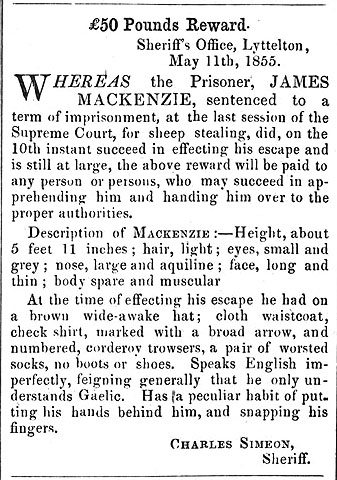Mackenzie
was a Highland shepherd, born in Ross-shire, Scotland. About
the year 1845 he emigrated to Australia, and two years later arrived
in New Zealand, and landed in Nelson.
At first he earned a living by sheep driving, and in that way became
acquainted with sheep stations in Otago and Canterbury.
After
residing for some time in the South Canturbury district , Mackenzie
tracked northward into the interior on an exploring expedition, on which
his only companion were his collie dog, and a bullock which carried
his possessions and his provisions. On this expedition he discovered
new country to the north-west of Timaru and of the Levels run, and Mr
Manson the Commissioner of Crown lands in Otago, afterwards gave him
a license to occupy country bearing north--west from Timaru and midway
between the sea and the west coast of the Middle Island.
 In
order to stock this territory Mackenzie followed methods said to have
been common enough at one tome in his native country- methods associated
in story with the name Rob Roy, whose economic gospel was that-
In
order to stock this territory Mackenzie followed methods said to have
been common enough at one tome in his native country- methods associated
in story with the name Rob Roy, whose economic gospel was that-
They should take who have the power.
And they should keep who can.
Accordingly Mackenzie, in 1855 cut from The Levels flock, with the assistance
of his dog, a mob of sheep, which he drove up the valley, over the pass,
and down to the plains; that is, into the district now known as the
Mackenzie Country. In the mob thus stolen there was a black sheep, which
was missed by Mr Sidebottom, overseer to the Messrs Rhodes, and next
time he mustered; and he also found that altogether a thousand had disappeared
from he flock.
With the help of a Maori boy, Mr Sidebottom got on the track of the
lost sheep. On reaching the plain of the new country they saw a bullock
in the distance, and further on came to a small tent, in which they
found a man asleep. On being aroused, the man leaped to his feet, seized
a piece of wood, with which he felled Mr Sidebottom to the ground, and
then ran away. After recovering from his stunned condition Mr Sidebottom
found the sheep, which were faithfully guarded by Mackenzie's dog.
Then, on returning to The Levels home station, he despatched the Maori
boy to Purau in Lyttelton harbour, to inform Mr Rhodes of what had happen,
and give him a description of Mackenzie, for whose apprehension Mr Rhodes
then offered a reward of �100.
Mackenzie, who was probably trying to escape the country, also made
his way to Lyttelton. Mr Rhodes told all the circumstances of the case
to myself as office in charge of the local police, and; in the end,
after much ingenuity and resources on my part, with two of myconstables,
I arrested Mackenzie late at night while he lay in bed in the loft of
a small shanty in Lyttelton.
Mackenzie was found to be a man of large size, with red hair, high cheek
bones, and piercing ferrety eyes. In due course he was placed on trial
in the Supreme Court. He remained stolid and silent and refused to plead.
But during his trail his dog was brought into court; and, at once recognising
her master, she wagged her tail and whined up towards Mackenzie, who
was so overcome that he shed tears.
Mr Sidebottom gave evidence that the dog in court was the same he had
seen guarding the sheep, and after he and I had described the conversation
which we had had with Mackenzie, the accused was judged guilty. Before
being sentenced, Mackenzie begged, with tears in his eyes that his dog
might be allowed to accompany him to his prison. But the dog was taken
south, where for years afterwards her progeny were much sought after
by runholders and shepherds.
Mackenzie was sentenced to five years' penal servitude. Within the first
year he escaped three times from custody, but was recaptured on each
occasion. It was, however thought advisable that, on account of the
trouble and expense caused by his escapes and captures, he should be
allowed to leave the country, under the proviso that, should he return,
he would be compelled to serve the unexpired term of his sentence.The
plan was carried out, and Mackenzie left for Sydney. He seems to have
returned to New Zealand, but on receiving significant hint from the
police, he left the country for ever.
Such are
the circumstances connected with the discovery of the fine pastoral
territory which has so long been known as the Mackenzie Country.
 In
order to stock this territory Mackenzie followed methods said to have
been common enough at one tome in his native country- methods associated
in story with the name Rob Roy, whose economic gospel was that-
In
order to stock this territory Mackenzie followed methods said to have
been common enough at one tome in his native country- methods associated
in story with the name Rob Roy, whose economic gospel was that-